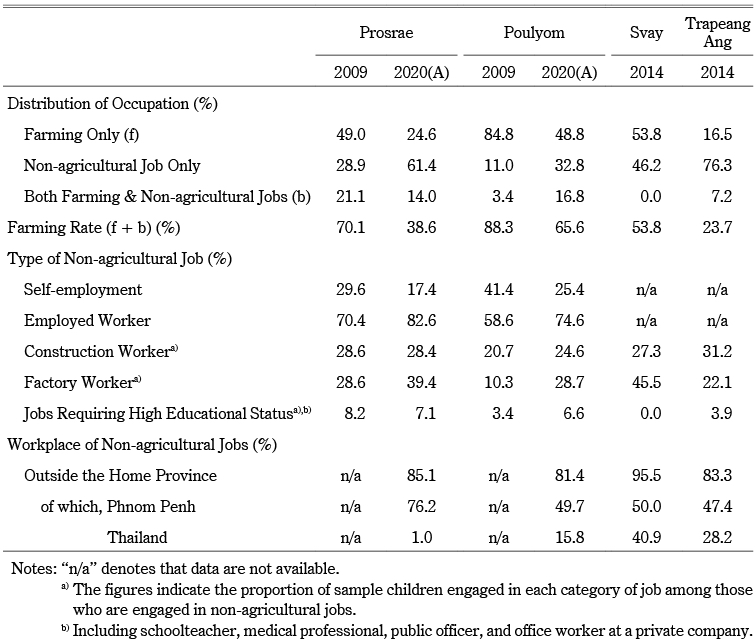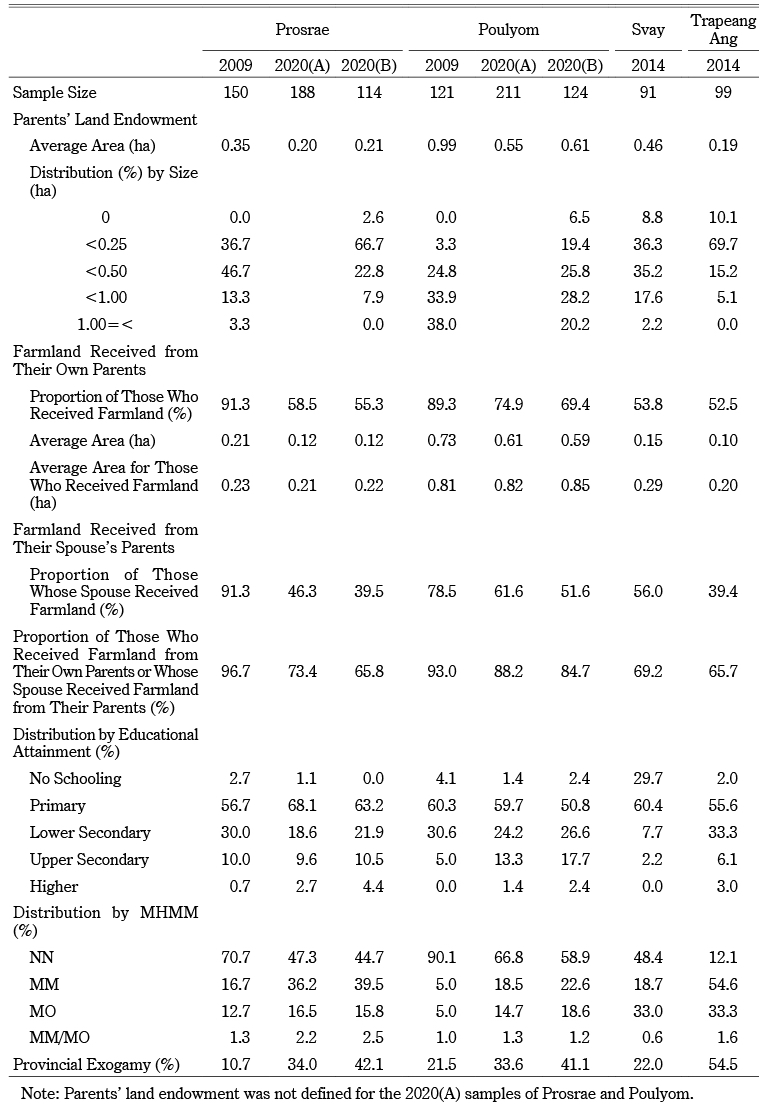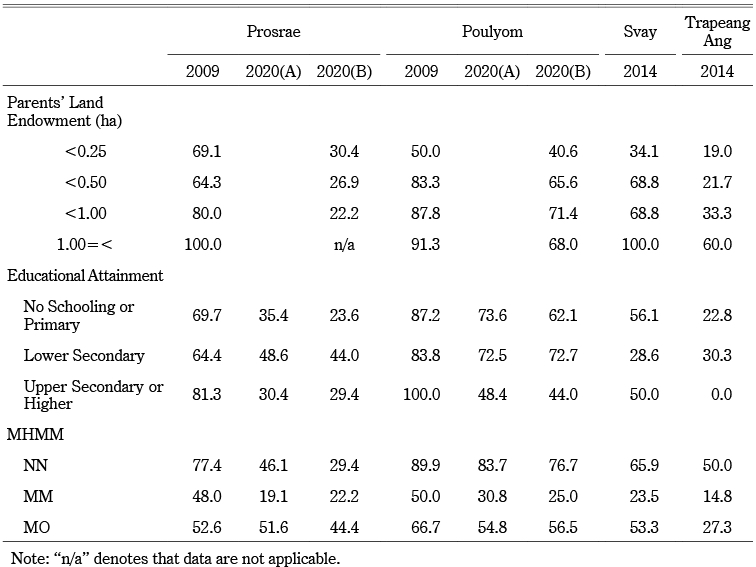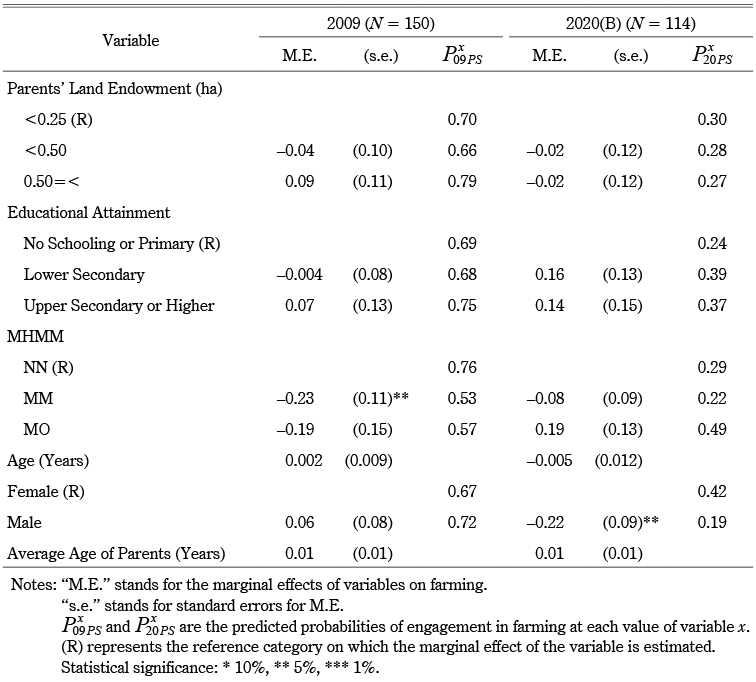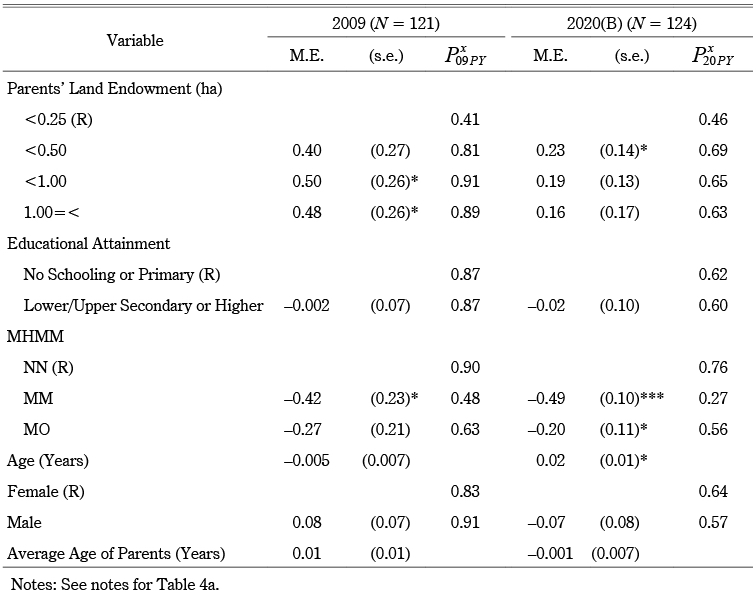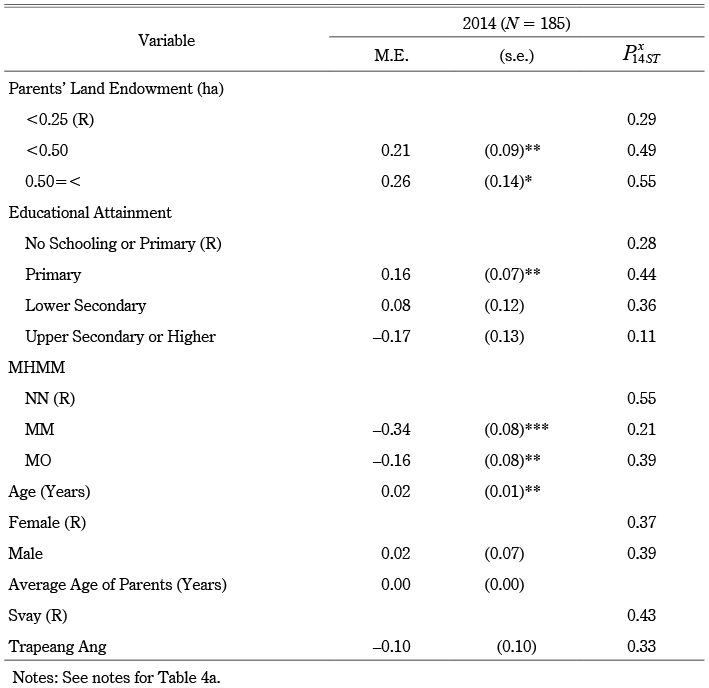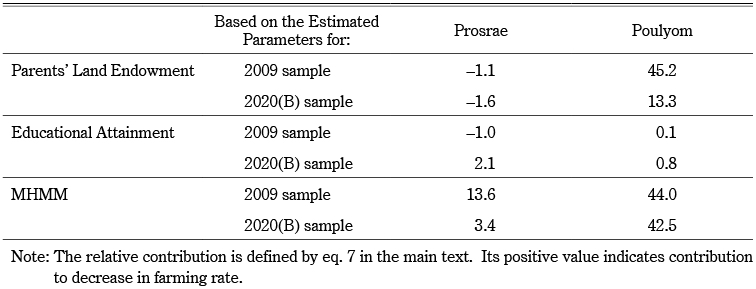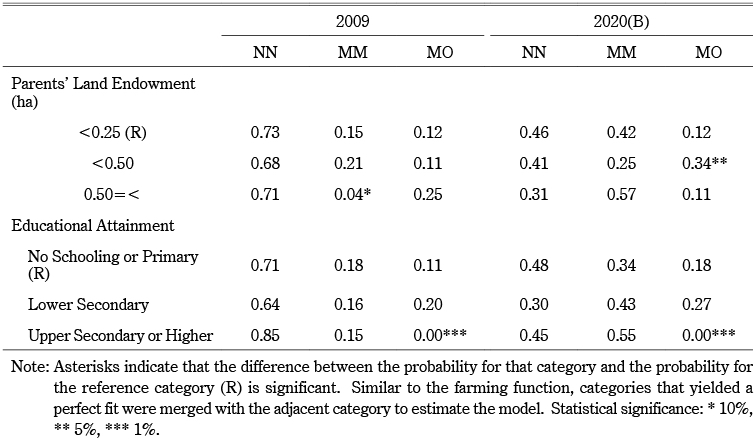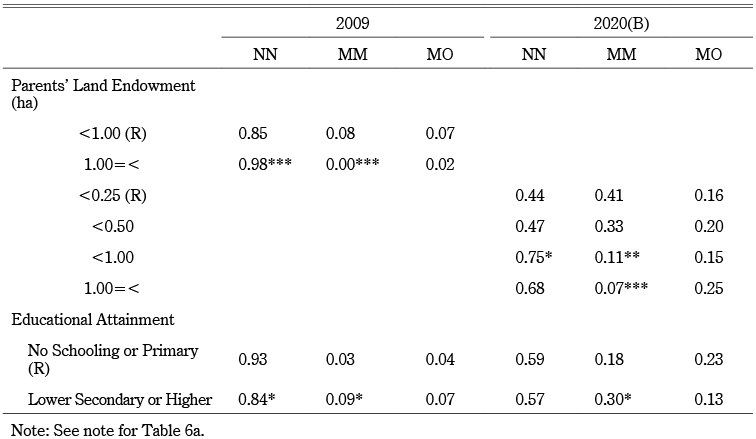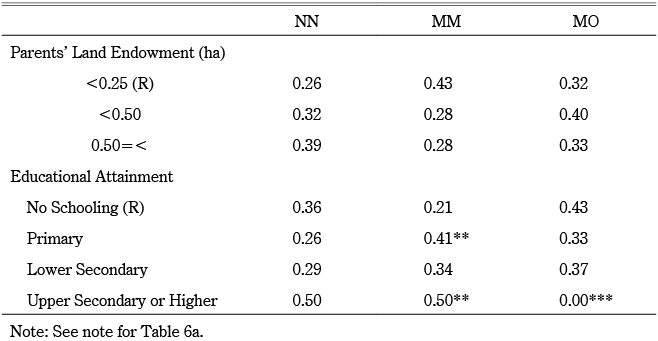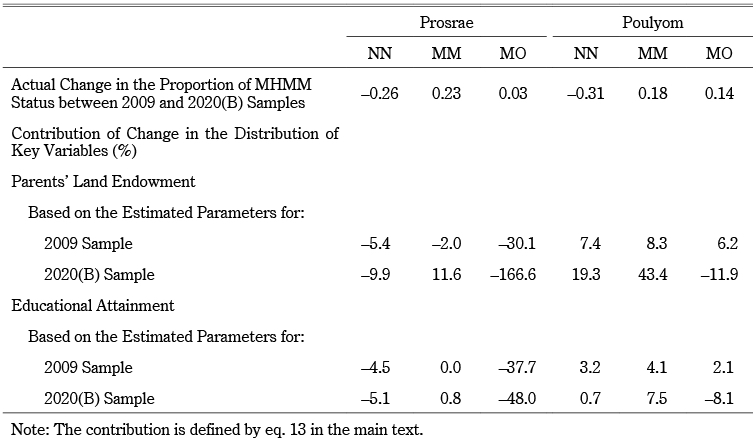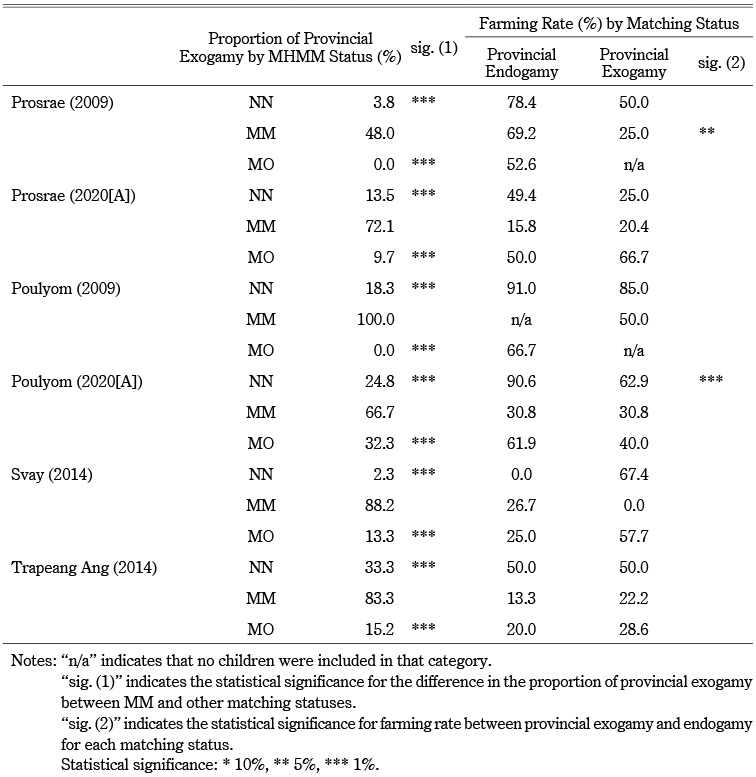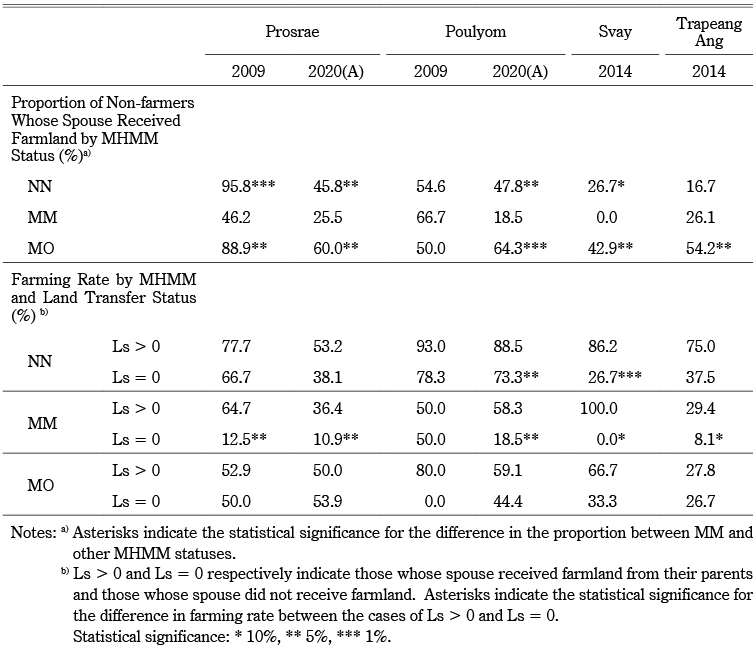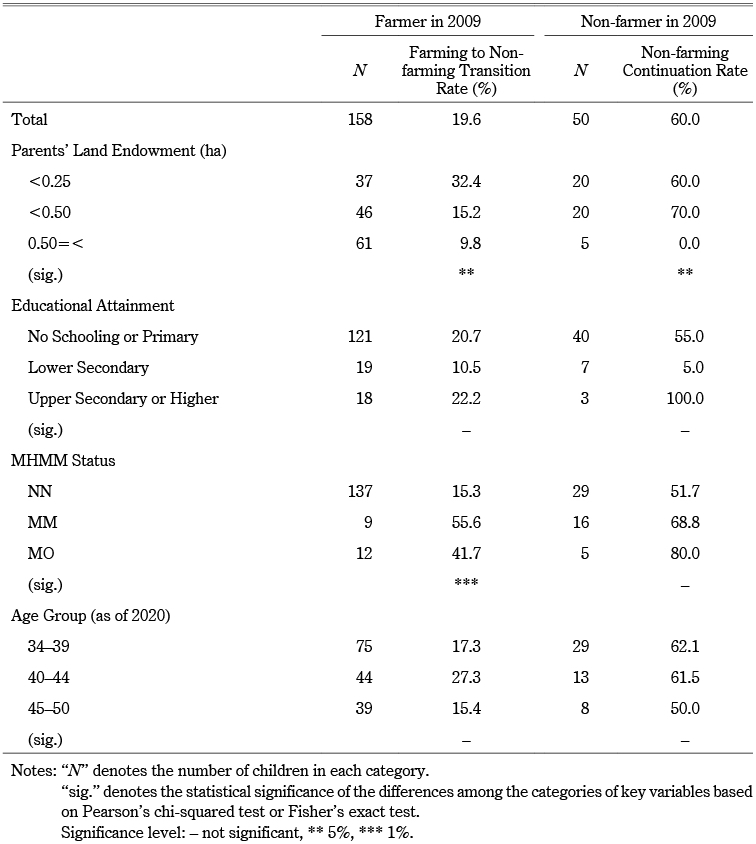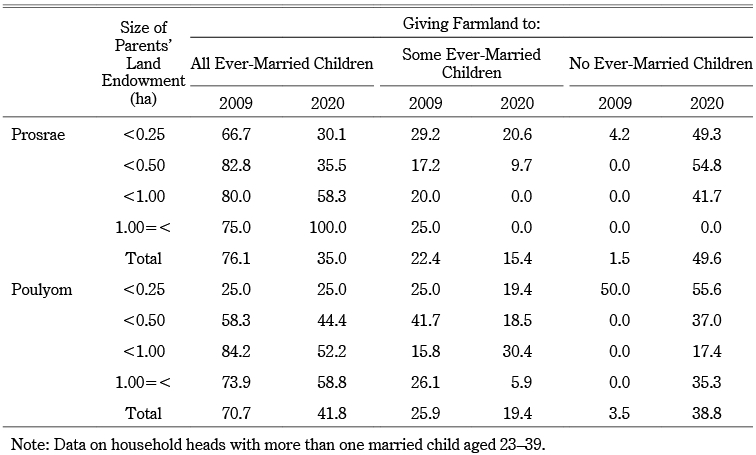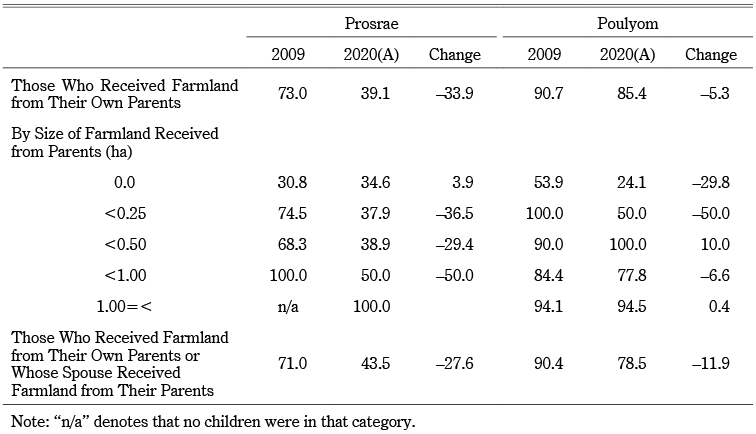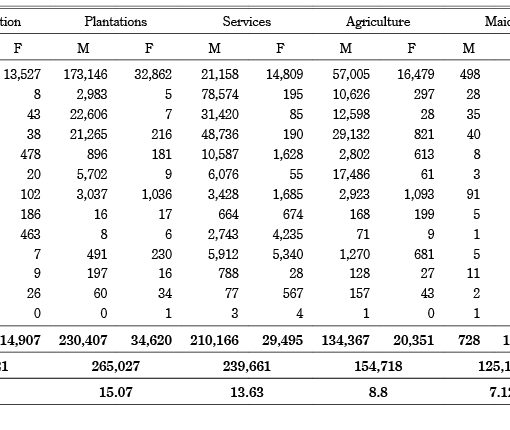Contents>> Vol. 13, No. 3
Roles of Marriage Matching, Land, and Education in the Rapid Deagrarianization of Cambodian Rural Youths during the 2010s
Yagura Kenjiro*
*矢倉研二郎, Faculty of Economics, Hannan University, 5-4-33 Amami-Higashi, Matsubara, Osaka 580-8502, Japan
e-mail: k-yagura[at]hannan-u.ac.jp
![]() https://orcid.org/0000-0001-8174-4658
https://orcid.org/0000-0001-8174-4658
DOI: 10.20495/seas.13.3_419
This study, using data on ever-married children aged 23–39 of household heads in four rice-growing villages in Cambodia, examines the mechanism underlying the rapid decrease in agricultural sector employment, or “deagrarianization,” among younger Cambodians during the 2010s. Special attention is devoted to the effects of increased marriage matching at the migration destination (MM), educational attainment, and decreased land availability. The stability of the deagrarianization process is also assessed.
Results of the descriptive and econometric analyses indicate that deagrarianization increased through the migration of younger people outside their home province to work as manual laborers in non-agricultural sectors. MM and decreased parents’ land endowments contributed significantly to deagrarianization, especially in villages where rice farming was an attractive occupation. Changes in parents’ land transfer behavior were not the cause but the result of deagrarianization. These findings suggest that changes in norms related to marital partner selection also underlie deagrarianization and that increased MM accelerated deagrarianization in Cambodia during the 2010s.
Data also indicate the low stability of non-agricultural employment, implying that deagrarianization in Cambodia might stagnate if its economy is impacted by even minor unfavorable shocks.
Keywords: deagrarianization, education, labor migration, land transfer, marriage, matching, occupational choice, rural youths
I Introduction
Structural transformation related to the share of agriculture in value-added and employment decline, or “deagrarianization” (Bryceson 1996), is a phenomenon common in the economic development of developing countries. Deagrarianization is an outcome as well as a causative factor of economic development. Therefore, understanding how it occurs is important for comprehending the mechanisms of economic development.
Cambodia experienced rapid deagrarianization in the 2010s.1) The GDP share of the agricultural sector (including forestry and fishery) decreased from 34 percent to 21 percent from 2010 to 2019. In the same period, not only did the sector’s employment share decline from 57 percent to 35 percent, but the absolute size of the agricultural workforce also decreased from 4.7 million to 3.2 million persons. That annual rate of decrease, –4.3 percent, was the highest among mainland Southeast Asian countries.2) Agricultural employment decreased in tandem with the adoption of labor-saving technologies such as agricultural machinery. Thus, agriculture’s labor productivity in Cambodia increased at an annual rate of 5.6 percent in the 2010s, also the fastest in the region.3)
This study aims to identify the factors behind the recent trend of deagrarianization in Cambodia, particularly among the married younger generation. The focus is specifically on the effects of parents’ land endowment, level of education, and mode of marriage matching. The validity and significance of setting such a research topic are discussed below.
Deagrarianization in Cambodia has been driven by an expansion of the construction and manufacturing industries, especially the garment industry.4) The large increase in the wage rates of those industries is likely to have attracted workers from the agricultural sector.5) Because non-agricultural employment opportunities are concentrated in the capital city of Phnom Penh and its suburbs, deagrarianization has been accompanied by an increase in the proportion of the urban population: from 27 percent in 2008 to 39 percent in 2019 (Cambodia, National Institute of Statistics 2022b).
Understanding how and why deagrarianization occurred and increased is indispensable for understanding the mechanisms and processes of industrialization, agricultural development, and urbanization in Cambodia. In this regard, the explanation that the development of urban non-agricultural sectors caused deagrarianization is a kind of tautology. We should answer the question of what factors prompted rural farm households or individuals to leave farms and take up non-agricultural jobs. This question, however, has not been addressed by earlier studies. Jiao Xi et al. (2017) found that education, ownership of physical assets, and access to infrastructure increased the likelihood of households choosing remunerative livelihood strategies. Yagura Kenjiro (2018a) found that land parcel sizes and productive assets negatively affected the likelihood of rural household members migrating for work. This implies that a lack of physical assets promoted deagrarianization, since migrant workers were engaged mostly in non-agricultural jobs. The above studies, however, did not specifically examine the occupational choice of rural youths, even though globally—as in Cambodia—deagrarianization is observed mainly among younger generations (Porzio et al. 2022). According to the 2008 and 2019 Cambodian population censuses, of the increase in non-agricultural workers of 1.97 million during 2008–19, 43 percent were under 24 years old as of 2019; 46 percent and 15 percent were, respectively, in the age groups of 25–34 years and 35–44 years.6) For the age group of 35–44 years as of 2019, non-agricultural employment increased by 0.3 million, while agricultural employment decreased by 0.25 million. This indicates that the labor force of this generation experienced a strong shift from agriculture to non-agricultural sectors during the 2010s. Another notable observation is that the proportion of those employed in non-agricultural sectors increased especially among married people under the age of 39: from 26 percent in 2008 to 51 percent in 2019. Overall, the share of married people engaged in non-agricultural jobs rose from 43 percent to 50 percent.
Studies in other countries have also examined the factors behind the deagrarianization of rural youths. The results of those studies indicate that limited access to farmland discouraged rural youths from choosing or continuing farming as an occupation (Bezu and Holden 2014; Kosec et al. 2018; Nag et al. 2018). Availability of farmland has decreased also in Cambodia, especially in populous lowland regions of the country, where uncultivated arable land is scarce.
Higher educational attainment has been identified as another factor promoting deagrarianization (Bezu and Holden 2014; Porzio et al. 2022), presumably because economic returns on education tend to be higher with non-agricultural jobs than with farming (Tien 2014; Herrendorf and Schoellman 2018). This holds true for rural youths in Cambodia, where educational attainment increased among younger people in the 2010s.7)
The above studies on deagrarianization have certain limitations. First, they all used data on households or individuals from rural villages. There was no data on people who had left the villages, which would have been indispensable for examining the causes of deagrarianization among rural youths since deagrarianization tends to entail migration from rural villages.
Second, earlier studies did not examine intertemporal occupational changes of individuals from agricultural to non-agricultural jobs. They did not consider whether or not deagrarianization resulted from the expansion of stable and long-term non-agricultural employment. If increased non-agricultural employment opportunities are generally unstable, people need to change frequently between agricultural and non-agricultural jobs. In that case, deagrarianization might stagnate even with minor economic shocks. Such a situation may be observed in northeastern Thailand, where rural household livelihoods continued to rely on farming as well as non-agricultural jobs because of the unstable, low-income nature of the latter (Rigg et al. 2014).
Third, earlier studies did not address the relationship between occupational choice and marital partner selection, both of which are important life events that most young people experience around the same time. Deagrarianization among rural youths mainly entails migration from rural to urban areas. Several studies have found that rural young migrants working in non-agricultural sectors in urban areas, if they are still single, tend to marry other migrants they meet at the migration destination in Cambodia (Derks 2008; Yagura 2012; 2015), China (Fan and Li 2002), and Vietnam (Bélanger and Haemmerli 2019). Such marriage matching is designated as “marriage matching at the migration destination” (MM). This is discussed in detail in the next section, but briefly: those who select their marriage partner through MM are predicted to choose non-agricultural jobs after marriage.
Some studies have examined the effects of premarital labor migration of rural youths in Cambodia (Yagura 2015; 2018b). However, these studies merely examined the effects of geographical exogamy on land transfer from parents to their married children. They did not specifically examine MM and occupational choice or deagrarianization. After analyzing data on unmarried young migrant workers in Phnom Penh, Yagura (2012) found that those who did not expect to receive farmland from their parents were more likely to consider someone they met in Phnom Penh as a future marital partner. This finding implies that limited availability of farmland, and hence a stronger deagrarianization tendency, is associated with MM. However, the study did not examine the effects of MM on deagrarianization.
If the positive effects of MM on deagrarianization are identified, three important implications arise. First, MM can accelerate deagrarianization because it is also a result of deagrarianization among rural youths before marriage in the form of migration to work in urban non-agricultural sectors. This observation suggests that an increase in MM can explain why Cambodia has experienced rapid deagrarianization in recent years. By contrast, limited access to land and an increase in the educational status of rural youths are less likely to accelerate deagrarianization because the effects of these two factors are theoretically predicted to decrease as deagrarianization progresses. Land scarcity diminishes as an increasing proportion of rural young people select non-agricultural jobs. Return on education, or an education premium in non-agricultural sectors, also decreases as an increasing number of rural youths with higher educational status enter the non-agricultural labor market. Second, if MM does indeed foster deagrarianization, it could serve as one contributing factor to the observed rise in deagrarianization among married people in Cambodia in recent years. Third, because MM becomes common only when parents in rural areas allow their adult children to freely choose their marital partner, changes in social norms related to marriage also underlie deagrarianization.
In order to fill these gaps, this study examines how and why deagrarianization among young people progressed in the 2010s in Cambodia. Special attention is devoted to whether—and the extent to which—an increase in MM and educational attainment and decreased access to land caused deagrarianization. Whether deagrarianization was accompanied by the expansion of stable non-agricultural employment is also examined.
To achieve its research objective, the study uses data on ever-married children of household heads residing in four rice-growing villages. The data cover both adult children residing in the villages as of the survey year and adult children who left the villages. National-level large-scale household surveys administered by the Cambodian government cannot be used for this study because they do not include such data. As a result, this study cannot provide a comprehensive picture of Cambodian deagrarianization in recent years. Despite this limitation, the study makes a unique contribution to deagrarianization research: it shows that MM is a potentially important factor in Cambodia’s rapid deagrarianization and highlights the importance of sociocultural factors underlying deagrarianization.
II Methodology
Sample
This study uses data collected through household surveys organized by the author in four villages. Prosrae in Prey Veng Province and Poulyom in Pousat Province were surveyed in 2009 and 2020. In the following sections, “2009 sample” and “2020 sample” for Prosrae and Poulyom respectively refer to data collected in 2009 and 2020.8) The two other villages, Svay and Trapeang Ang, are in Takeo Province, and the surveys there were conducted in 2014. The distances from Phnom Penh, are approximately 60 km for Prosrae, 170 km for Poulyom, and about 100 km for the two villages in Takeo Province.
For the surveys, all households in these villages except those from which adult members were absent were assessed using structured questionnaires. The 2020 survey was conducted from February to early March, before Covid-19 impacted the households’ economic situation.
When investigating the impact of socioeconomic changes on the course of deagrarianization, only data from Prosrae and Poulyom were used because that inquiry needed data from at least two time periods. Data on Svay and Trapeang Ang were available only for 2014 and therefore used solely to examine the effect of socioeconomic factors on occupational outcomes of sample children as of 2014. As it happens, a survey was conducted in these two villages in 2002. However, since it was not intended for research on the deagrarianization of rural youths, the data necessary for this study were not wholly collected.
For the surveys, research assistants interviewed the heads of households in the villages to collect data on the households and household members as well as the household heads’ children. The children included those who had migrated abroad as well as those who were no longer household members at the time of the survey, such as those who had established their own household after marrying within or outside the village. Information on the spouses of the married children, such as whether they received land from their own parents, was also collected.
To examine the effect of MM on deagrarianization, this study used data on household heads’ adult children aged 23–39 who had been married one or more times (i.e., who were married, divorced, or widowed) at the time of the survey. Adult children younger than 23 years were excluded because some of them were still studying at university and hence unsuitable for this research. The upper age limit was set as 39. Older individuals could not be regarded as belonging to the younger generation, and they were unsuitable for analyses of the effects of MM because only a few had migrated before marriage, especially in the 2009 samples from Prosrae and Poulyom. Also, in these two 2009 samples, some adult children older than 39 might have received farmland from the government after the dissolution of collective farming in villages in the 1980s, after the fall of the Pol Pot regime.9) Therefore, parents’ land endowment, a key variable representing the availability of land for ever-married children, did not affect the children’s choice of occupation.
At the time of the surveys, rice farming was the primary economic activity in these villages. Other crops were not grown on a large scale. No arable land had been left uncultivated in these villages by the 1990s. However, the number of households increased afterward. As a result, the area of farmland per household decreased in these villages, at least during the 2000s and 2010s. The average area of farmland owned by the surveyed households decreased from 0.73 to 0.56 hectares in Prosrae and from 2.13 to 1.97 hectares in Poulyom during 2009–20. In the two villages in Takeo, the area of farmland per household decreased from 1.36 to 0.87 hectares in Svay and from 0.68 to 0.57 hectares in Trapeang Ang between 2002 and 2014. Nationally, the average size of farmland per agricultural household was 1.6 hectares as of 2013,10) indicating that Poulyom was relatively land rich while the other three villages were relatively land scarce.
In Prosrae and Poulyom, irrigation facilities became available in the 2010s and farmers started growing rice twice a year in the same fields by 2020, which indicates that land constraints had been virtually lifted in these villages. In Svay there were paddy fields where rice could be planted in the dry season, but they were flooded and could not be used in the rainy season.
By 2020, rice farmers in Prosrae and Poulyom had adopted labor-saving technologies such as agricultural machinery, including tractors and combine harvesters, as well as direct seeding of rice instead of transplanting. The situation was the same in Svay in 2014. These technologies became commonplace in the 2010s, which suggests that deagrarianization among younger people induced labor shortages. However, the technological changes also reduced labor demand for farming. They therefore might have sped up deagrarianization among young people.
None of the surveyed villages were located along main roads or had markets. There were no factories nearby. As a result, non-agricultural employment opportunities for villagers were limited mainly to small family businesses within the village, such as grocery stores. Due to the scarcity of non-agricultural employment opportunities, increasing numbers of young people from these villages migrated for work.
The reasons for choosing Prosrae, Poulyom, Svay, and Trapeang Ang for this study are as follows. First, all these villages are located in the Central Plain zone or provinces surrounding Tonle Sap Lake, where Cambodia’s rural population is concentrated.11) In addition, the main characteristics of these villages—rice being the major crop, no room for expanding farmland, and a scarcity of non-agricultural employment opportunities—were also common to most villages in the regions mentioned above. Thus, the findings from this study were expected to apply to most of Cambodia’s rural population. Second, as shown above, these villages have all experienced decreasing access to land and increasing out-migration of the younger generations. These are conditions that the sample villages for this study had to satisfy to enable an examination of the effect of decreased access to land and MM on deagrarianization. Population outflow was also considered to be a common feature of the Central Plain and Tonle Sap Lake regions because the population growth rates between 2008 and 2019 of all the provinces in these regions were below the national average.
Finally, there are some socioeconomic differences among the four villages, such as distance from Phnom Penh, the major destination of migrant workers from these villages, and the average size of farmland per household. This allows us to grasp the effects of the differences as well as examine conditions under which the key variables exert an influence on deagrarianization.
Key Variables
(1) Land Endowment
Following Yagura (2015), land availability is represented by the land endowment of the parents of the sample ever-married children before the children were married. It is defined as the size of farmland that the sample children’s parents owned at a specific time before the children’s marriage, divided by the number of children of the parents (i.e., the number of siblings of the sample children).
For Prosrae and Poulyom, the number of children of a specific age range was used as the denominator. The age range was set as younger than 40 for the 2009 sample and younger than 50 for the 2020 sample, because adult children older than that were likely to have received farmland from the government in the 1980s and therefore unlikely to impact the availability of land to be given to younger children. The area of parents’ farmland as of 2009 was used for the 2020 sample because the data collected through the 2009 survey could be used. For the 2009 sample, the area of farmland parents had owned immediately before giving farmland to any of their children for the first time after having received it from the government in the 1980s was used. This data was also collected through the 2009 survey.
Based on the definition of parents’ land endowment above, for analyses using the parents’ land endowment for Prosrae and Poulyom, sample children of 2020 were limited to those who had married after 2009 because the land size as of 2009 was used to calculate the parents’ land endowment. This sample is designated as the “2020(B) sample.” Sample children of 2020, including those who married in or before 2009, are designated as the “2020(A) sample,” for which parents’ land endowment data is lacking. Therefore, the sample size of the latter is larger than that of the former. It is also clear that the 2020(B) and 2009 samples do not overlap, but some 2020(A) sample children are included in the 2009 sample. It is important to note that the 2009 and 2020(A) samples do not constitute a single set of panel data, for two reasons. First, the 2020(A) sample includes those who were married after 2009 while the 2009 sample does not. Second, those whose ages were between 29 and 39 as of 2009 are included in the 2009 sample but not in the 2020(A) sample, because they were 40 years or older as of 2020.
For Svay and Trapeang Ang, the area of parents’ farmland as of 2002 was used to calculate parents’ land endowment because this data had been collected through a survey in 2002. Based on this definition, only data on adult children who married after 2002 were used for analysis in this study. For the number of children used as the denominator, those who married before 2002 were not included because many of them were likely to have already received farmland from their parents by then. Thus, the number of children who married before 2002 would have no significant impact on the land allocation from parents to children married after 2002 if parents’ land endowment was evaluated based on the area of farmland as of 2002.
In earlier studies (Bezu and Holden 2014; Kosec et al. 2018; Nag et al. 2018), land availability for young people was represented by the actual or expected size of the land parcel received from their parents or the size of land they owned after the land transfer from their parents. However, the effects of land availability on deagrarianization of young people could not be captured by examining the relation between those variables and choice of occupation. This is because parents might tend to bequeath land to adult children who decide to choose farming as their occupation. In such cases, lack of land is not the cause but the result of deagrarianization.
Parents’ land endowment before the adult children’s marriage as defined above is unaffected by the children’s occupational choice after marriage if parents give land to their adult children after marriage, as is true of Cambodia. It can still affect whether the adult children receive land from parents or the size of land given. Therefore, it can affect the adult children’s occupational choice after marriage.
(2) Educational Attainment
Educational attainment, represented as a categorical variable, is based on the highest level of school in which the sample child enrolled.
(3) Migration History and Mode of Marriage Matching
To analyze MM effects, the categorical variable Migration History and Mode of Marriage Matching (MHMM) was defined with three categories: those who did not migrate before marriage (NN), those who migrated before marriage and met their marital partner at the migration destination (MM), and those who migrated before marriage and met their partner in another way (MO).
MM is taken to promote deagrarianization through three types of effects. “Skill effect” is applicable when both husband and wife (i.e., an adult child and his or her spouse) have skills for the non-agricultural jobs in which they are engaged at the migration destination where they met. Using those skills, they can earn higher incomes in non-agricultural jobs even after marriage. For example, according to a sample survey in 2016 and 2017, garment factory workers in Cambodia received an annual wage increase of a few dollars for each year they continued to work in the same factory (International Labour Organization 2018). This included the legally mandated seniority allowance (an additional USD 1 per year) as well as incentives reflecting the workers’ skill, such as the difficulty and output of the job. Therefore, continuing with non-agricultural jobs is an economically better choice for the couple than farming in their home province, even if they receive farmland from their parents.
“Geographical exogamy effect” is the tendency for couples matched at a migration destination to be geographically exogamous—to have different places of origin—because a migration destination attracts young people from different regions throughout the country. Even if both husband and wife receive farmland from their respective parents, geographically exogamous couples are discouraged from farming because their farmland parcels are located in their respective places of origin, potentially far from each other. The disparate locations make it difficult for the couple to manage their farmland parcels efficiently. In addition, such couples have difficulty receiving help for farming from one or the other set of parents.
“Land transfer effect” applies when marriage partners who meet at a migration destination receive little or no farmland from their parents after marriage, which makes it difficult for such couples to earn a living by farming. Their likelihood of receiving land from parents is small because young people who migrate to work are more likely to come from households with small land endowments and feel a greater need to support their family through labor migration (and remittances).
These three types of MM effects indicate that meeting a marriage partner at a migration destination can be predicted to induce deagrarianization. However, those who experienced labor migration before marriage but met their partner in some other way (MO) are also predicted to be more likely to choose non-agricultural jobs after marriage than those who did not migrate before marriage (NN) because the labor migration experience would foster their non-agricultural job skills.
Effects of Key Variables on Changes in Farming Rate
Using data from Prosrae and Poulyom, this study assessed the factors underlying changes during 2009–20 in the proportion of ever-married children engaged in farming, or the “farming rate.” This study defines “those engaged in farming,” or “farmers,” as people whose primary or secondary occupation was farming in the year preceding the survey year based on information provided by sample children’s parents (i.e., household heads).12) This means that for the 2020 sample, the occupational situation in 2019 was used for analysis; therefore, the effects of the Covid-19 pandemic that were felt in 2020 can be ignored.
The effects of the three key variables on decrease in farming rate were examined using the following procedure. First, “farming functions,” or the logit model that determined the probability of sample children engaging in farming, were estimated. The model was estimated separately for each sample (2009 and 2002[B]) for each of the two villages. Data on the two villages were not pooled because the villages had different socioeconomic environments and therefore the effect of each variable on sample children’s occupational choice was also thought to be different.
The dependent variable is a dichotomous variable F, which takes a value of 1 if an ever-married child was engaged in farming and 0 otherwise. Explanatory variables include the above three key variables and other attributes of the child and their parents, such as the child’s gender and age and the parents’ average age,13) which were considered to affect the child’s occupational choice.
With P[∙] standing for probability, the logit model is expressed as the expected probability of an ever-married child i in sample year y to be engaged in farming, as shown below:

Therein, the following are used:

Also, Es(y)i, Lt(y)i, and Mu(y)i respectively denote educational attainment, parents’ land endowment, and MHMM.  is the vector of explanatory variables except the three key variables, and a(y), βs(y), γt(y), δu(y), and θy are associated coefficients.
is the vector of explanatory variables except the three key variables, and a(y), βs(y), γt(y), δu(y), and θy are associated coefficients.
The three key variables are expressed as categorical variables. Educational attainment is categorized by the child’s highest educational attainment: no schooling or primary education, lower secondary education, and upper secondary or higher education. Parents’ land endowment is categorized by the size of land (less than 0.25 ha, 0.25–0.50 ha, 0.5–1 ha, and 1 ha or larger). MHMM is categorized into three states (MM, MO, and NN), as mentioned above. A variable is categorical if it is made up of several dummy variables, one of which has a value of 1 and the others all have a value of 0 for each sample. For example, if ever-married child i’s educational attainment is lower secondary education, then s = 1 and hence E1(y)i = 1 and E0(y)i = E2(y)i = 0. The value of the parents’ land endowment Lt(y)i for each child is also assigned similarly. With regard to Mu(y)i, u = 0, 1, and 2 respectively stand for the MHMM statuses of NN, MM, and MO.
Second, the baseline farming rate, FRyv, for each year and village is derived as the average of the expected probability of F = 1 over the sample children:

Therein, Ĝyi is derived from Gyi by replacing parameters with estimated values from the logit model. Ny represents sample size.
Third, the probability of engagement in farming was calculated under the assumption that the value of one key variable takes a specific value for all sample children. For example, the farming rate under the assumption that all sample children’s educational attainment is lower secondary education (i.e., s = 1) is derived as shown below:

Therein,  is the vector of explanatory variables other than educational attainment and
is the vector of explanatory variables other than educational attainment and  is the vector of estimated parameters. Hypothetical farming rates of this kind were calculated for each value of each of the three key variables, and for each year and village.
is the vector of estimated parameters. Hypothetical farming rates of this kind were calculated for each value of each of the three key variables, and for each year and village.
Fourth, a combined hypothetical farming rate was calculated for each of the three key variables for each year and village, which represents the farming rate in 2009 (or 2020) when the distribution of the key variable was that of the 2020(B) (or 2009) sample. For example, the combined hypothetical farming rate in 2009 if the distribution of educational attainment is that of the 2020(B) sample was derived as shown below:

In eq. 4,  is the proportion of children in the 2020(B) sample for whom educational attainment is categorized as s. The combined hypothetical farming rate in 2020 with respect to educational attainment was also derived by replacing the distribution of the educational attainment of the 2020(B) sample with that of the 2009 sample.
is the proportion of children in the 2020(B) sample for whom educational attainment is categorized as s. The combined hypothetical farming rate in 2020 with respect to educational attainment was also derived by replacing the distribution of the educational attainment of the 2020(B) sample with that of the 2009 sample.

Finally, the effects of a change in the distribution of each key variable on the change in the farming rate during 2009–20 are defined as the difference between the combined hypothetical farming rate and baseline farming rate. For example, in the case of educational attainment, its effect based on the 2009 sample is as follows:

Its relative contribution to the change in farming rate was calculated as shown below:

For Svay and Trapeang Ang, it was not possible to analyze the effects of changes in the distribution of the key variables because data were obtained only for 2014. Therefore, the farming function (logit model) was estimated and the marginal effect of each key variable on the probability of engagement in farming was analyzed. Data from the two villages were pooled to estimate the model because the sample size for each village was too small to obtain reliable results of the logit model if the models were estimated by village.
Effects of Land Endowment and Educational Attainment on MHMM
Educational attainment and parents’ land endowment may also affect MHMM: changes in the distribution of these two variables between the two time periods may indirectly contribute to a decline in farming rates by changing the distribution of MHMM. For example, if parents’ land endowment is small, their children may be more likely to migrate to work before marriage to supplement their low agricultural income. As a result, parents’ land endowment may be negatively correlated with the probability of NN and positively with the probability of MM or MO. Also, if parents have a small land endowment, their children will expect that the probability of receiving farmland after marriage is low or that the area of farmland they receive will be small. They may then decide, even before marriage, that they will not engage in farming after marriage. Thus, they do not need to avoid MM, which may be disadvantageous for farming due to its geographical exogamy and land transfer effects as described above. As a result, they may be more likely to choose MM. Similarly, if higher educational level promotes non-agricultural employment, there may be a positive correlation between educational attainment and MM.
Therefore, an examination was also made of whether and to what extent these two variables affected MHMM. The multinomial logit model was estimated using MHMM, a multinomial variable with three states, as the dependent variable and educational attainment, parents’ land endowment, and other variables as explanatory variables. For Prosrae and Poulyom, similar to the logit model, the model was estimated by village and separately for the 2009 and 2020(B) samples. Using the 2009 sample as an example, the probabilities that a sample child would choose NN, MM, and MO are expressed by the following equations, respectively:



Where,

U = MM or MO, and α09U, ρs(09)U, τt(09)U, and φ09U are coefficients or vectors of coefficients to be estimated.
Based on estimated coefficients, the predicted probability that the MHMM of sample children would be NN, MM, or MO when educational attainment or parents’ land endowment took a specific value was calculated. For instance, the predicted probability that the MHMM of a sample child would be MM when their parents’ land endowment was in category 0 (i.e., less than 0.25 hectares) was calculated by retaining L0(09) and removing Lt(09) (t ≠ 0) from the terms consisting of H09[MM]09. Similarly, predicted probabilities were computed for other categories of parents’ land endowment values, and probabilities of choosing NN and MO were also calculated.
Based on the predicted probabilities of each parents’ land endowment value, the predicted probabilities of each MHMM state for the whole sample were calculated based on the distribution of parents’ land endowment for the 2009 and 2020(B) samples by the following equations, respectively:


In these equations,  is the proportion of children in the 2009 sample for whom parents’ land endowment is categorized as t, and
is the proportion of children in the 2009 sample for whom parents’ land endowment is categorized as t, and  is that of children in the 2020(B) sample.
is that of children in the 2020(B) sample.  is the predicted probability that the MHMM of a sample child is U(= NN, MM, or MO) when their parents’ land endowment is in category t based on the estimated coefficients for the 2009 sample.
is the predicted probability that the MHMM of a sample child is U(= NN, MM, or MO) when their parents’ land endowment is in category t based on the estimated coefficients for the 2009 sample.
Next, the percentage contribution that a change in the distribution of parents’ land endowment made to the change in MHMM status U between 2009 and 2020 was computed:

The denominator  is the actual change in the proportion of each MHMM state between 2009 and 2020. Based on the definition of the contribution in the above equation, if the value of the contribution is negative, it means that changes in the key variable affected changes in the distribution of MHMM in the opposite direction to the actual changes.
is the actual change in the proportion of each MHMM state between 2009 and 2020. Based on the definition of the contribution in the above equation, if the value of the contribution is negative, it means that changes in the key variable affected changes in the distribution of MHMM in the opposite direction to the actual changes.
Similarly, the multinomial model for the 2020(B) sample was estimated, and using the estimated coefficients the contribution of changes in the distribution of parents’ land endowment was calculated. Following the same method, the contribution of changes in the distribution of educational attainment was calculated. For Svay and Trapeang Ang, only the multinomial model was estimated; the contribution could not be computed because data on only one time point were available.
The multinomial logit model presented above is based on the assumption that MHMM is endogenously determined. The problem here is that if MHMM is included as an exogenous explanatory variable in the farming function, the estimation results may be biased. A bias arises when factors not included in the model as explanatory variables are correlated with both MHMM and farming status—that is, when MHMM is considered endogenous in the logit model. For example, the child’s farming skill, which is unobservable and not included in the model, can be correlated negatively with both the probability of choosing MM and that of being engaged in farming after marriage if those who had lower farming skill levels were more likely to migrate before marriage.
To check the endogeneity of MHMM in the logit model, the model developed by Partha Deb and Pravin Trivedi (DT model) (2006) was applied. The DT model simultaneously estimates a multinomial logit model with a multinomial variable as the dependent variable and an outcome function with the multinomial variable as one of the explanatory variables. In our case, the multinomial variable is MHMM and the outcome function is the farming function specified as the logit model. The DT model allows us to test the endogeneity of a multinomial explanatory variable in the outcome function, and to obtain unbiased estimation results even when the variable is endogenous.
However, when an attempt was made to estimate the DT model separately for Prosrae and Poulyom, it was not possible. That is, the likelihood functions failed to converge. Therefore, an attempt was made to estimate the DT model by combining the data on the two villages, but it was still impossible to estimate for the 2020(B) sample. For the 2009 sample, the model was estimable only if the outcome function was specified as a linear probability model instead of logit model. According to the estimation result, the exogeneity of MHMM could not be rejected. For Svay and Trapeang Ang, the DT model could not be estimated. From the above results, although the possibility of MHMM’s endogeneity could not be completely ruled out, the estimation results of the logit model with MHMM as a simple exogenous explanatory variable were used.
Tests of How MM Worked
Whether the detected correlation between MM and farming rates reflected MM’s promotional effect on deagrarianization was verified, and the way in which MM induced deagrarianization was identified. To that end, a check was made on whether the correlations between variables satisfied the necessary conditions for MM to have each of the three types of effects mentioned above.
For a skill effect, the condition is that among sample children or their spouses who received farmland from their parents, those whose MHMM status is MM (MM children) are less likely to be engaged in farming than other sample children. This is because they can earn more from non-agricultural jobs than from farming, even if they have farmland to cultivate.
For a geographical exogamy effect, the following two conditions need to be fulfilled: (1) the proportion of geographical exogamy is higher for MM than for NN and MO children; and (2) among MM children, the farming rate is lower for geographically exogamous than for geographically endogamous children. In this study, a marriage is regarded as geographical exogamy if the couple’s provinces of origin mutually differ.
For a land transfer effect, the following two conditions should be fulfilled: (1) among those who were not engaged in farming (non-farmers), the proportion of sample children whose spouse received farmland from their parents is lower for MM than for NN or MO children; and (2) among MM children, the farming rate is lower for those whose spouse did not receive farmland from their parents than for those whose spouse did receive farmland. In the first condition, those who were engaged in farming (farmers) were not considered because they needed farmland given by either their own or their spouse’s parents, irrespective of MHMM status. Therefore, the land transfer status reflects occupational choice in addition to the spouse’s parents’ land endowment.
Tests for geographical exogamy and land transfer effects can also detect whether the observed association between MM and farming reflects the effects of MM or the effects of unobservable factors. This is because in those two tests differences in farming rates between MM and the other two MHMM statuses (NN and MO) were not directly compared.
Effects of Key Variables on Occupational Change
The effects of key variables on individual-level occupational change during 2009–20 were analyzed for Prosrae and Poulyom using data on children from both the 2009 and 2020 samples, designated as the “panel sample.” Specifically, changes in their occupation—farmer or non-farmer—between the two years were examined and two indicators were constructed. The first was “farming to non-farming transition rate,” defined as the percentage of farmers as of 2009 who were non-farmers in 2020. The second was the “non-farming continuation rate,” defined as the percentage of non-farmers as of 2009 who were still non-farmers in 2020. Then, the association between each of the two indicators and the key variables as of 2009 was examined.
Farming to non-farming transition rate and non-farming continuation rate respectively capture the delayed effect and persistence of the effect of the key variables on deagrarianization. These two indicators are predicted respectively to be negatively associated with parents’ land endowment and to be positively associated with educational attainment if decreased land availability and increased educational attainment promoted deagrarianization. If MM promoted deagrarianization, then the value of these indicators would be higher for MM progeny.
Through the non-farming continuation rate, the stability of non-agricultural employment was also examined, with a higher non-farming continuation rate indicating greater stability in the sense that a larger proportion of sample children continued to be non-farmers during 2009–20.
The non-farming continuation rate is predicted to be lower for older sample children (that is, they are predicted to be less likely to continue their non-agricultural jobs) for two reasons: (1) the major non-agricultural jobs of sample children were manual jobs, such as factory and construction work, which are more suitable for younger workers; and (2) as the children grow older, so do their parents, and therefore the children need to return to their home village to care for their elderly parents. To assess age effects, the association between non-farming continuation rate and the age of the sample children was examined.
Effects of Change in Parents’ Land Transfer Behavior
To elucidate the effects of decreased land availability on deagrarianization, it is necessary to also examine the relation between occupational choice and the status and size of land transfer from parents. For example, if farming rates among those who received land from parents decreased between the two time periods, then decreased availability of land was unlikely to constrain the ever-married children’s engagement in farming.
In this regard, it is worth examining whether parents’ land transfer behavior has changed and whether the change has promoted their ever-married children’s deagrarianization. In the case of Cambodia, “equal division” was the norm—parents gave land to all their children irrespective of gender and birth order, at least in the late 2000s (Yagura 2015). If an increasing proportion of parents deviated from the equal division norm irrespective of their children’s needs or wishes, then an increasing proportion of their ever-married children were forced to engage in non-agricultural jobs. However, if an increasing proportion of ever-married children were willing to choose non-agricultural jobs for any reason, then in response parents would give land only to those ever-married children who wanted or intended to engage in farming. Consequently, the change in parents’ land transfer behavior would be not the cause but the result of deagrarianization.
This study also examined changes in farming rate among those who received land from their parents and changes in the proportion of parents (household heads) who followed the equal division norm. This analysis was conducted only for Prosrae and Poulyom because it required data from two time periods.
III Socioeconomic Changes between the Two Periods
Occupational Changes
Table 1 shows the distributions of the occupations of sample children and their workplaces. The farming rates decreased from 2009 to 2020: from 70 percent to 39 percent in Prosrae and from 88 percent to 66 percent in Poulyom. The decreases were attributable mainly to decreases in the proportions of full-time farmers. The farming rates were low also in Svay (54 percent) and Trapeang Ang (24 percent). The data demonstrate that deagrarianization of the younger generation occurred in the surveyed villages.
Table 1 Distributions of Occupations and Workplace Types and Non-agricultural Jobs
The data also suggest that deagrarianization progressed through the migration of younger people outside their home province to work as employees in non-agricultural sectors, not because of thriving non-agricultural self-employed businesses in the villages nor because of the development of non-agricultural sectors in rural areas. The following observations support this finding. First, those engaged in both farming and non-agricultural jobs were a small minority, indicating that becoming a part-time farmer who also ran a business such as a grocery shop or small-scale trade was not the major form of deagrarianization. Second, most of the sample children’s non-agricultural jobs were employed work. A large proportion of the sample children were workers employed in construction or factories. Other types of employed workers included restaurant waiters and craft workers such as electricians. Third, more than 80 percent of the sample progeny engaged in non-agricultural jobs in 2020 were working outside their home provinces, especially in Phnom Penh or Thailand.
An increase in educational attainment of young people, if any, was unlikely to be a major force of deagrarianization in these villages, for two reasons (see Table 1). First, in the sample of children engaged in non-agricultural jobs, a small minority had occupations requiring high educational backgrounds, such as schoolteacher, public officer, and office worker at a private company. Second, the proportion of such children did not increase during 2009–20 in Prosrae; it increased in Poulyom but only slightly.
Changes in Socioeconomic Attributes
Table 2 presents changes in the socioeconomic attributes of the sample children. In both Prosrae and Poulyom, the sizes of parents’ land endowment decreased by around 40 percent during 2009–20 on average. The decreases resulted from large increases in the number of people whose parents’ land endowment was smaller than 0.25 hectare. Consistent with the decreased land endowments of parents, the proportion of sample children who received farmland from their own parents decreased considerably, especially in Prosrae. The average area of farmland received also decreased. It is particularly interesting that for those who received farmland from their parents, the average area of farmland received did not change much between the two years: around 0.2 hectare in Prosrae and 0.8 hectare in Poulyom. This lack of change suggests that parents avoided land fragmentation in order to ensure the economic viability of farming for the next generation. In Svay and Trapeang Ang, parents’ land endowments were also small, and only around half the sample children received farmland from their own parents.
Table 2 Socioeconomic Attributes of Sample Children
The proportion of sample children whose spouse received farmland from their parents (parents-in-law of the sample children) also decreased in Prosrae and Poulyom. As a result, especially in Prosrae, the proportion of those who received farmland from either their own or their spouse’s parents decreased to a greater degree.
The farmland parcels received from parents, especially by sample children from Prosrae, Svay, and Trapeang Ang, were not large. Therefore, non-agricultural jobs would provide these children with a higher income than rice farming even if their spouse also received farmland and even if double cropping were feasible. According to data on 2021 collected from Prosrae by the author, the estimated net income from growing rice in one season was around 0.9 million riels per hectare.14) If a couple received 0.2 hectare of farmland from each of the husband’s and wife’s parents and grew rice twice a year, the net annual income from rice farming would be 0.72 million riels. However, the annual wage income for a garment factory worker was at least approximately 9.2 million riels.15) Even for sample children from Poulyom who received 0.8 hectare of farmland from each of their own and their spouse’s parents and who grew rice twice a year on that field, the net annual income from rice farming was estimated at 2.2 million riels per hectare per season—about 7.1 million per year in all—based on data on farming in 2020.16) Although the income per working day from rice farming was not small, due to the adoption of labor-saving technologies such as direct seeding and use of machinery, these figures indicate that for most sample children it was more lucrative to migrate to work as a factory or construction worker for a year.
Educational attainment clearly increased in Poulyom: the proportion of sample children with upper secondary education increased considerably. In Prosrae, the increase in educational attainment was reflected by only a small increase in higher education. In Svay and Trapeang Ang educational attainment was generally low.
With respect to MHMM status, in both Prosrae and Poulyom the proportions of those who did not migrate before marriage (NN children) decreased to a large degree; the proportion of MM children increased as a result. The proportion of MM children was high also in Trapeang Ang, exceeding 50 percent, as a result of a very low proportion of NN children. The ratio of MM to MO (MM/MO) increased especially in Prosrae, indicating that MM became more common among those who migrated before marriage in the 2010s. An increase in the proportion of MM reflects the increase in migration of unmarried youths to a specific destination such as Phnom Penh because it expands the pool of possible marital partners in the migration destination.
Norms of marital partner selection might also have changed. According to data on household heads in the two villages in 2009, 79 percent of their marital partners were selected by their parents. Since then, although data is lacking, parents might have become more likely to accept their children’s choice of partner. Alternatively, an increase in the migration of unmarried children might affect parents’ attitudes about their children’s partner selection.
Reflecting the increase in MM, and consistent with this study’s hypothesis on the geographical exogamy effect of MM on deagrarianization, the proportion of sample children whose marriage was regarded as provincially exogamous increased also in Prosrae and Poulyom. Although not shown in Table 2, for MM children from these two villages with provincially exogamous marriages, only 13 percent of their spouses were from Phnom Penh; 87 percent were from other provinces, indicating that most MM children married migrant workers from other provinces.
Farming Rates by Key Attributes
Table 3 shows farming rates by the values of the three key variables. It is worth noting that the farming rates shown in the table represent simple correlation between each of the key variables and farming, without correcting for the effects of other variables. Therefore, it is not possible to conclusively assess the effects of the key variables on deagrarianization.
With respect to parents’ land endowment, in Prosrae and Poulyom farming rates tend to be higher for sample children whose parents’ land endowments were large in 2009. The same tendency was observed also in Svay and Trapeang Ang. However, in Prosrae and Poulyom, the farming rates had decreased for almost all size classes of land endowment by 2020. Differences between the size classes had diminished by 2020. It is particularly interesting that the 2020 farming rate in Prosrae was lower for sample children with large parental land endowments. The data suggest that decreases in parents’ land endowment were not a major driving force for the decrease in farming rate in Prosrae.
Table 3 Farming Rates (%) by Value of Key Attributes of Sample Children
Regarding educational attainment, in Prosrae and Poulyom, farming rates for those who attained upper secondary or higher education were higher in 2009 than in 2020; but in 2020 their farming rates tended to be lower than those for people with lower educational levels. In Trapeang Ang, those who attained upper secondary or higher education were all engaged in non-agricultural jobs. These data suggest that an increase in educational attainment induced deagrarianization. However, the effect of educational attainment is unlikely to be significant because a large majority of non-agricultural jobs of the sample children did not require a high level of education in either 2009 or 2020, as mentioned above.
Farming rates by MHMM status were consistent with the prediction that MM induces deagrarianization, because the farming rate for MM children was much lower than that found for NN or MO children.
IV Results of Analyses
Effects of Key Variables on Farming Rate Changes
Tables 4a–4c present estimation results obtained from the logit model. Specifically, the tables show the marginal effects (M.E.) of explanatory variables on the probability of engagement in farming. For categorical variables, M.E. is calculated for each category and is defined as the difference in the predicted probability of engagement in farming for that category in comparison with that for the reference category (R) of the categorical variable. For a continuous variable, M.E. is defined as the change in the predicted probability attributable to one unit of change in the variable.
Table 4a Estimation Results of Farming Function (Logit Model) (Prosrae)
Table 4b Estimation Results of Farming Function (Logit Model) (Poulyom)
Table 4c Estimation Results of Farming Function (Logit Model) (Svay and Trapeang Ang)
For land endowment and educational attainment, some categories completely predicted farming choices (called “perfect fit”), and coefficients could not be estimated. In such cases, the category was merged with the adjacent category to estimate the model. Such categories included the “1.0 ha=<” category of parents’ land endowments for Prosrae and Svay and Trapeang Ang (this was merged with “0.5 ha<”), and the “upper secondary or higher education” category of educational attainment for Poulyom (this was merged with “lower secondary education”).
The results can be summarized as follows. First, in Prosrae, the probability of engagement in farming did not differ significantly by the size of parents’ land endowment in either 2009 or 2020. In Poulyom as well as in Svay and Trapeang Ang, the probability was significantly lower for the size class of less than 0.25 ha than for larger size classes. These results suggest that parents’ land endowments affected their ever-married children’s occupation choice in these three villages.
Second, educational attainment did not have a significant correlation with the probability of engagement in farming in Prosrae and Poulyom in either 2009 or 2020. In Svay and Trapeang Ang, primary education had a significant positive effect on the probability of engagement in farming, but educational attainment higher than primary education did not have a significant effect. These results are consistent with the fact that non-agricultural jobs of sample children mostly did not require a high educational level.
Third, except in the 2020 sample of Prosrae village, the probability of engagement in farming was significantly lower for MM children than for NN children even when controlled for other variables, including the size of parents’ land endowment. This result suggests that the association between MM and farming was not a mere reflection of the association between MM and parents’ land endowment but that MM itself adversely affected engagement in farming. The effect of MM also differed from the effect of migration experience per se, for two reasons. First, differences between MO and NN children in terms of their probability of engagement in farming were not significant except for the cases of Poulyom village in 2020 and Svay and Trapeang Ang. Second, the differences observed in these cases were much smaller than the difference between MM and NN children.
Table 5 presents the relative contributions of changes in the distributions of the respective key variables to changes in the farming rate during 2009–20 for Prosrae and Poulyom. Two values of contributions were calculated for each variable: one based on the estimated parameters of the logit model for the 2009 sample, and the other based on that for the 2020 sample.
Table 5 Relative Contributions of Distributional Changes in Key Variables to Changes in Farming Rate
The contribution of change in the distribution of parents’ land endowment differed significantly by village. In Poulyom, the change contributed 45 percent of the decrease in farming rate based on estimated parameters for the 2009 sample. However, the contribution was only 13 percent when the estimated parameters of the 2020 sample were used for calculation. This is because the marginal effect of parents’ land endowment was smaller for the 2020 sample than for the 2009 sample in Poulyom (Table 4b). In Prosrae the contributions were negative, although their absolute values were small. This finding reflects the fact that while the share of the less than 0.25 ha class increased significantly during 2009–20 (Table 2), the predicted probability of farming for the smallest size class was not smaller than that for other classes (Table 4a).
The relative contribution of change in the distribution of MHMM, or the increase in MM, was as large as 40 percent in Poulyom. That large contribution reflects the large negative marginal effect of MM on the probability of farming (Table 4b). In Prosrae the relative contribution of MHMM was 13.6 percent based on the parameters for the 2009 sample, which was the largest among the three key variables. However, the contribution was only 3.4 percent if it was derived from parameters for the 2020 sample. The small contribution resulted from the fact that no significant difference was found between NN and MM in the predicted probability of engagement in farming for the 2020 sample (Table 4a).
Change in the distribution of educational attainment did not make a sizable contribution to change in farming rate in either village.
It is worth noting that, in contrast to Poulyom village, no key variable made a large contribution to the decrease in farming rate in Prosrae if the contribution was calculated using the parameters for the 2020 sample. This finding suggests that the deagrarianization of youths in Prosrae in the 2010s was caused not by socioeconomic changes among the young people or their households but mainly by pull factors such as increased employment opportunities and wage levels in non-agricultural sectors in Cambodia.
A possible reason for the lack of a significant association between the key variables and engagement in farming in Prosrae is that, for most of the youths in Prosrae, farming is economically much less attractive than non-agricultural jobs, irrespective of MHMM status and size of farmland received from parents. This is indicated by the fact that net income from rice farming per hectare per season was much lower in Prosrae than in Poulyom, as noted in the preceding section. The higher income from rice farming in Poulyom resulted from higher yields (4 vs. 3.5 tons/ha) and a higher selling price of rice (1,020 vs. 800 riels/kg). The latter was due mainly to differences in the rice varieties grown in each village (high-priced aromatic vs. low-priced non-aromatic rice). This argument implies that for youths from villages where farming is an attractive occupation, such as Poulyom, changes in land endowment and MHMM status can be anticipated to be a major driving force of deagrarianization.
Effects of Land Endowment and Educational Attainment on MHMM
Tables 6a–6c show the predicted probabilities of each MHMM state by value of parents’ land endowment and educational attainment based on the estimated coefficient of the multinomial logit model. Although the multinomial logit model was estimated including the same explanatory variables as for the farming function, only the results for the two key variables are presented in the tables.
Table 6a Predicted Probabilities of MHMM Based on Multinomial Logit Model (Prosrae)
Table 6b Predicted Probabilities of MHMM Based on Multinomial Logit Model (Poulyom)
Table 6c Predicted Probabilities of MHMM Based on Multinomial Logit Model (Svay and Trapeang Ang)
As shown in Tables 6a and 6b, when parents’ land endowment was relatively large, the probability of MM was significantly low for the 2009 sample of Prosrae and the 2009 and 2020(B) samples of Poulyom. Conversely, when parents’ land endowment was small, the probability of MM was relatively high.
However, for the 2020(B) sample of Prosrae and for Svay and Trapeang Ang, there was no significant correlation between parents’ land endowment and probability of MM. It should be noted that in these cases, the probability of NN was lower than in Poulyom even when the size of parents’ land endowment was large (i.e., more than 0.5 hectare). In other words, sample children in these villages were more likely to migrate to work before marriage regardless of the size of parents’ land endowment. This suggests that it was more difficult to make a living from farming in these villages or that conditions were more conducive to migrant work. In fact, compared to Poulyom, these villages are closer to Phnom Penh, the main destination for migrant workers.
With respect to educational attainment, the probability of MM tended to be higher for those who had a relatively high educational background in Poulyom, Svay, and Trapeang Ang. However, as shown in Tables 4a–4c, the probability of engagement in farming after marriage for highly educated people was not significantly lower than that for low-educated people. Therefore, the observed correlations between educational background and probability of MM appear to be unrelated to differences in occupational choice by educational background.
Based on the estimation results of the multinomial logit model, the contribution of changes in the distribution of educational attainment and parents’ land endowment to changes in the distribution of MHMM between 2009 and 2020 in Prosrae and Poulyom were calculated (Table 7). The focus was on the contribution to the change in the proportion of MM, which had the effect of lowering farming rate. The contribution of changes in the distribution of parents’ land endowments was large in Poulyom when it was computed based on parameters estimated for the 2020 sample. It corresponded to 43 percent of the increase in the proportion of MM (0.18). In addition, as shown in Table 5, the contribution of changes in the distribution of MHMM to decrease in farming rate was large in Poulyom. Therefore, in Poulyom a change in the distribution of parents’ land endowment, especially an increase in the proportion of those with smaller land endowments, indirectly contributed to deagrarianization by changing the distribution of MHMM.
Table 7 Contribution of Changes in the Distribution of Key Variables to Changes in MHMM
On the other hand, the contributions of changes in the distribution of educational attainment to changes in the proportion of MM were small in both villages. Combining this result with the data shown in Table 5, one may conclude that changes in educational attainment did not contribute significantly to the decline in farming rate in these two villages, either directly or indirectly.
How MM Worked
The types of effects MM exerted on the occupational choice of young people from the two villages were examined by ascertaining whether the data satisfied the conditions for each effect presented in Section 2. The analysis in this section did not need parents’ land endowment data. Therefore, the 2020(A) sample instead of the 2020(B) sample was employed for the analysis of Prosrae and Poulyom in 2020. The former lacks parents’ land endowment data. However, due to its larger size compared to the 2020(B) sample, the 2020(A) sample was better suited for statistical hypothesis testing.
(1) Skill Effect
The existence of a skill effect was found for both the 2009 and 2020 samples from Prosrae and Poulyom and the sample from Svay and Trapeang Ang (Table 8). In fact, the farming rate was significantly lower for MM children than for NN or MO children among the sample children who received farmland from their own or their spouse’s parents. Migration experience before marriage, however, also seems to have deterred engagement in farming after marriage for the 2009 sample of Prosrae, because the farming rate for MO children was also significantly lower than that for NN children.
Table 8 Test of the Skill Effect of MM
(2) Geographical Exogamy Effect
A geographical exogamy effect was observed only for the 2009 sample of Prosrae village: the proportion of provincial exogamy was significantly larger for MM children than for NN or MO children; for MM children, farming rate was significantly lower for provincial exogamy than for provincial endogamy (Table 9). For the other samples, no significant difference was found in farming rates between provincial exogamy and endogamy for MM children. For the 2009 sample of Poulyom, no geographical exogamy effect could be inferred because there was no case of provincial endogamy among MM children.
Table 9 Test of Exogamy Effect of MM
(3) Land Transfer Effect
Except for the 2009 sample of Poulyom, the existence of a land transfer effect was indicated by the following two facts: (1) among non-farmers, the proportion of sample children whose spouse received farmland from parents was lower for MM children than for NN or MO children; and (2) among MM children, the farming rate was lower for those whose spouse did not receive farmland from their parents (Ls = 0) than for those who did (Ls > 0) (Table 10).
Table 10 Test of Land Transfer Effect of MM
In summary, effects of all three types were observed in at least one of the four villages. Moreover, MM was found to have at least one type of effect for each of these four villages and in both 2009 and 2020 for Prosrae and Poulyom. The existence of geographical exogamy and land transfer effects also suggests that the negative association between MM and the probability of engagement in farming found by the estimation of the logit model was not explained solely by unobservable factors correlated with both MM and farming; hence, MM itself was found to have a significant effect on the progeny’s occupational choice, as explained above.
Effects of Key Variables on Occupational Change
Table 11 presents the farming to non-farming transition rate and the non-farming continuation rate of the panel sample by the values of the key variables. The data of Prosrae and Poulyom villages were combined because the sample size was too small to conduct statistical tests. The data indicate that, consistent with the results of the analysis presented above, smaller parents’ land endowment and MM promoted deagrarianization. For farmers as of 2009, farming to non-farming transition rate was high among those whose parents’ land endowments were small or whose MHMM status was MM, which indicates that they were more likely to switch their occupation from farming to non-farming during 2009–20. In the case of non-farmers as of 2009, smaller parents’ land endowments were significantly associated with higher non-farming continuation rate, which means that ever-married children with small parents’ land endowment were more likely to continue to be non-farmers during 2009–20. However, educational attainment did not have a significant association with either farming to non-farming transition rate or non-farming continuation rate.
Table 11 Transition of Occupation for Panel Sample by the Values of Key Variables in 2009
The data also suggest that non-agricultural employment was not very stable: the non-farming continuation rate was 60 percent for the sample as a whole; in other words, 40 percent of non-farmers as of 2009 had become farmers by 2020. It is reasonable to infer that employment in non-agricultural sectors was temporary for many adult children because the major non-agricultural jobs of the sample children were unskilled factory work and construction work, in which layoffs were not uncommon. The low non-farming continuation rate was not a result of age, because non-farming continuation rate had no significant association with the age of sample children.
Nevertheless, although it is not shown in Table 11, the farming rate of the panel sample decreased from 76 percent to 71 percent during 2009–20. This was because the number of sample children who switched employment from farmer to non-farmer (31 persons) was larger than those switching vice versa (20 persons). This finding also reflects the fact that the major non-agricultural jobs for sample children were unskilled manual jobs, which were easy for young people to get.
Effects of Changes in Parents’ Land Transfer Behavior
As shown in Table 12, during 2009–20 the proportion of household heads, or the proportion of parents of sample children, who gave farmland to all their ever-married children decreased in Prosrae and Poulyom. The proportion of those who had not given farmland to any of their ever-married children increased, irrespective of the size of land endowment in both villages. These data suggest that parents of the younger generation came to limit land transfer to fewer of their married children, which apparently promoted deagrarianization among young people.
Table 12 Percentage of Household Heads (Parents of Sample Children) by Land Transfer Status
However, the change in parents’ land transfer behavior is unlikely to have caused the deagrarianization of their ever-married children. The reason for this is that, as Table 13 shows, the farming rate for sample children who received farmland from their parents (or their spouse’s parents) decreased in both villages in most cases. In other words, an increasing proportion of sample children chose non-agricultural jobs even though they had farmland to cultivate.17) These data indicate that it was not a decrease in the proportion of sample children who received farmland from their parents that induced deagrarianization among young people. Rather, the data suggest that parents gave farmland to fewer of their married children because a decreasing proportion of their children chose farming as their occupation after marriage and because parents came to give land only to those children who had some intention of starting farming after marriage.
Table 13 Farming Rate (%) by Status and Area of Farmland Received from Parents
V Conclusion
This study used data on ever-married children of household heads in four rice-growing villages to examine the deagrarianization of Cambodian rural youths in the 2010s. Special attention was devoted to the effects of increased marriage matching at the migration destination (MM) and educational attainment as well as decreased land availability. The stability of the deagrarianization process was also assessed. The major findings of the study and their implications are summarized below.
First, deagrarianization in the sample villages was induced not through the development of non-agricultural sectors in rural areas nor through self-employed businesses in these villages but rather through the migration of younger people beyond their home province to work as employees in non-agricultural sectors, especially as unskilled construction and factory workers in Phnom Penh and Thailand.
Second, increased MM made a considerable contribution to deagrarianization mainly through its skill and land endowment effects. This finding suggests that because MM was induced by the deagrarianization of rural youths through labor migration before marriage, an increase in MM was the reason why deagrarianization accelerated especially among married people during the 2010s in Cambodia. This finding also implies that norms regarding marital partner selection changed, with parents coming to respect their children’s initiative in choosing a partner, and that the change in norms might also have induced deagrarianization among young people.
Third, decreased parents’ land endowment contributed significantly to deagrarianization, especially in the village with larger land endowments (Poulyom). In Poulyom, a reduction in the size of parents’ land endowment also promoted deagrarianization by increasing the probability of MM. It is worth noting, however, that even sample children who received farmland from their parents became less likely to choose farming as their occupation. Therefore, deagrarianization was a result of the children’s own initiative in choosing non-agricultural jobs rather than a consequence of decreasing availability of land because of changes in the land transfer behavior of their parents.
Fourth, the results of the analyses suggest that the effects of both MM and parents’ land endowment were not significant when farming was economically a much less attractive choice than non-agricultural employment. In such cases, deagrarianization was caused mostly by pull factors such as increased opportunities and the higher wage rates of non-agricultural jobs.
Fifth, consistent with the fact that the major non-agricultural jobs of ever-married children involved unskilled manual work, increased educational attainment did not cause deagrarianization to an appreciable degree. This finding suggests that increasing the educational level of rural youths will not promote industrialization in Cambodia without the development of industries requiring an educated workforce.
Finally, reflecting the fact that common non-agricultural jobs involve unskilled manual work, the stability of non-agricultural employment was not high: not a few of those who once chose non-agricultural jobs returned to farming within a decade. This finding implies that deagrarianization in Cambodia might stagnate if its economy is hit by even a minor unfavorable shock.
The limitation of this study is that its findings cannot be extrapolated to rural Cambodia as a whole because they are based on data from a few villages. However, they are likely to be applicable to most of the rural population of Cambodia because the surveyed villages have characteristics in common with most villages in the Central Plain and areas surrounding Tonle Sap Lake, where Cambodia’s rural population is concentrated. Furthermore, the results of this study may apply to both relatively land-rich and relatively land-poor areas because the surveyed villages include both types of villages.
Nevertheless, it cannot be argued that this study’s findings may apply to areas where parents’ land endowment is much larger and where there is room for expanding farmland. Such situations seem to have existed in the 2010s especially in the northern and northeastern parts of Cambodia. Particularly the major finding that MM and decreased parents’ land endowment promoted deagrarianization is unlikely to apply to such areas. Farmers can earn a high income from farming alone if their land endowment is large, and therefore their children do not need to migrate to work before marriage. This means a lower likelihood of children marrying through MM. Also, if farmland can be expanded by clearing land, the scale of farmland that adult children can obtain after marriage will be less constrained by the land endowment of their parents. In that case, parents’ land endowment will not have a significant effect on married children’s occupational choice.
To clarify the extent to which the findings of this study can be extrapolated to rural Cambodia in general and to unveil the characteristics of regions to which they can apply, further research is needed which uses nationwide data encompassing a broader spectrum of geographic areas.
Accepted: November 9, 2023
Acknowledgments
This work was supported by JSPS KAKENHI Grant Number JP19H00559. I extend my heartfelt gratitude to residents of the surveyed villages for their cooperation. I am also deeply indebted to my research assistants for conducting the surveys.
References
Bélanger, Danièle and Haemmerli, Guillaume. 2019. “We No Longer Fear Brides from Afar”: Marriage Markets and Gendered Mobilities in Rural Vietnam. Asian and Pacific Migration Journal 28(3): 245–270. https://doi.org/10.1177/011719681986906.↩
Bezu, Sosina and Holden, Stein. 2014. Are Rural Youth in Ethiopia Abandoning Agriculture? World Development 64: 259–272. https://doi.org/10.1016/j.worlddev.2014.06.013.↩ ↩ ↩
Bryceson, Deborah Fahy. 1996. Deagrarianization and Rural Employment in Sub-Saharan Africa: A Sectoral Perspective. World Development 24(1): 97–111. https://doi.org/10.1016/0305-750X(95)00119-W.↩
Cambodia Development Resource Institute (CDRI). Various years. Cambodia Development Review. https://cdri.org.kh/publication/type/cambodia-development-review, accessed September 9, 2022.↩
Cambodia, National Institute of Statistics. 2022a. General Population Census of Cambodia 2019: Series Thematic Report on Literacy and Educational Attainment in Cambodia. Cambodia Ministry of Planning. http://nis.gov.kh/nis/Census2019/Thematic%20Report%20Literacy%20and%20Educational%20Attainment-Eng.pdf, accessed February 20, 2023.↩
―. 2022b. General Population Census of Cambodia 2019: Series Thematic Report on Population Distribution and Urbanization. Cambodia Ministry of Planning. http://nis.gov.kh/nis/Census2019/Thematic%20Report%20Population%20Distribution%20and%20Urbanization-Eng_Re4.pdf, accessed February 20, 2023.↩
―. 2015. Census of Agriculture of the Kingdom of Cambodia 2013: National Report on Final Census Results. Cambodia Ministry of Planning. http://nis.gov.kh/nis/CAC2013/Final_Report_En.pdf, accessed March 13, 2020.↩
―. 2009. General Population Census of Cambodia 2008, Report 2: Spatial Distribution and Growth of Population in Cambodia. Cambodia Ministry of Planning.↩
Deb, Partha and Trivedi, Pravin K. 2006. Specification and Simulated Likelihood Estimation of a Non-normal Treatment-Outcome Model with Selection: Application to Health Care Utilization. Econometrics Journal 9(2): 307–331. https://doi.org/10.1111/j.1368-423X.2006.00187.x.↩
Derks, Annuska. 2008. Khmer Women on the Move: Exploring Work and Life in Urban Cambodia. Honolulu: University of Hawai‘i Press.↩
Fan, C. Cindy and Li Ling. 2002. Marriage and Migration in Transitional China: A Field Study of Gaozhou, Western Guangdong. Environment and Planning A: Economy and Space 34(4): 619–638. https://doi.org/10.1068/a34116.↩
Herrendorf, Berthold and Schoellman, Todd. 2018. Wages, Human Capital, and Barriers to Structural Transformation. American Economic Journal: Macroeconomics 10(2): 1–23. https://doi.org/10.1257/mac.20160236.↩
International Labour Organization. 2018. How Has Garment Workers’ Pay Changed in Recent Years in Cambodia? Cambodian Garment and Footwear Sector Bulletin 7 (June). https://www.ilo.org/asia/publications/issue-briefs/WCMS_631686/lang–en/index.htm, accessed August 15, 2019.↩
Jiao Xi; Pouliot, Mariève; and Walelign, Solomon Zena. 2017. Livelihood Strategies and Dynamics in Rural Cambodia. World Development 97: 266–278. https://doi.org/10.1016/j.worlddev.2017.04.019.↩
Kosec, Katrina; Ghebru, Hosaena; Holtemeyer, Brian; Mueller, Valerie; and Schmidt, Emily. 2018. The Effect of Land Access on Youth Employment and Migration Decisions: Evidence from Rural Ethiopia. American Journal of Agricultural Economics 100(3): 931–954. https://doi.org/10.1093/ajae/aax087.↩ ↩
Nag, A.; Jha, S. Kumar; Mohammad, A.; Maiti, S.; Gupta, J.; Gosain, D.K.; Datta, K.K.; and Mohanty, T.K. 2018. Predictive Factors Affecting Indian Rural Farm Youths’ Decisions to Stay in or Leave Agriculture Sector. Journal of Agricultural Science and Technology 20(2): 221–234. http://jast.modares.ac.ir/article-23-2566-en.html, accessed September 20, 2021.↩ ↩
Porzio, Tommaso; Rossi, Federico; and Santangelo, Gabriella V. 2022. The Human Side of Structural Transformation. American Economic Review 112(8): 2774–2814. https://doi.org/10.1257/aer.20201157.↩ ↩
Rigg, Jonathan; Promphaking, Buapun; and Le Mare, Ann. 2014. Personalizing the Middle-Income Trap: An Inter-generational Migrant View from Rural Thailand. World Development 59: 184–198. https://doi.org/10.1016/j.worlddev.2014.01.031.↩
Tien Nguyen Dung. 2014. An Analysis of Labour Market Returns to Education in Vietnam: Evidence from the National Labour Force Survey 2012. Turin School of Development Working Papers, No. 3, International Training Centre, ILO, Turin. http://hdl.voced.edu.au/10707/383521, accessed September 20, 2021.↩
World Bank. Various years. World Development Indicators. World Bank. https://databank.worldbank.org/source/world-development-indicators, accessed April 16, 2024.↩
Yagura Kenjiro. 2018a. The Effects of Assets on the Destination Choice of Migrants from Rural Cambodia: The Moderating Role of Family Bond and Networks. Journal of Rural Problems 54(4): 165–176. https://doi.org/10.7310/arfe.54.165.↩
―. 2018b. The Effect of Premarital Migration on Land Inheritance: The Case of Ever-Married Children from Cambodian Rural Villages. Hannan Ronshu (Social Science) 54(1): 15–35. http://id.nii.ac.jp/1104/00002363/, accessed February 5, 2019.↩ ↩
―. 2015. Intergenerational Land Transfer in Rural Cambodia since the Late 1980s: Special Attention to the Effect of Labor Migration. Southeast Asian Studies 4(1): 3–42. https://doi.org/10.20495/seas.4.1_3.↩ ↩ ↩ ↩ ↩ ↩
―. 2012. Does Labour Migration Offer Opportunities for Meeting Prospective Spouses? The Case of Migrant Workers in Cambodia. Population, Space and Place 18(3): 277–294. https://doi.org/10.1002/psp.683.↩ ↩
1) Data in this paragraph are based on the World Bank’s World Development Indicators (World Bank, various years).
2) The figures for other countries are: Thailand –2.3 percent, Vietnam –1.7 percent, Myanmar –0.6 percent, and Laos 0.6 percent.
3) The figures for other countries are: Vietnam 4.8 percent, Thailand 3.6 percent, Myanmar 2.1 percent, and Laos 1.8 percent.
4) According to the population census of Cambodia, during 2008–19 employment in the manufacturing industry increased from 0.43 million to 1.14 million and in the construction industry from 0.14 million to 0.45 million.
5) According to data collected by the Cambodia Development Resource Institute (CDRI), the daily earnings of garment factory workers and unskilled construction workers in 2018 were approximately 30,000 riels, doubling in real terms from 2010 (CDRI, various years).
6) The sum of these figures exceeds 100 because the change in non-agricultural employment for respondents who were 45 and older was negative.
7) According to population census data, for the age group of 25–34 years, the proportion of those who attained secondary or post-secondary education increased from 27 percent in 2008 to 40 percent in 2019 (Cambodia, National Institute of Statistics 2022a).
8) Data collected in 2009 were used also for earlier studies (Yagura 2015; 2018b).
9) Yagura (2015) presents details of land allocation processes in the two villages.
10) This figure is based on the agricultural census conducted in 2013 (Cambodia, National Institute of Statistics, 2015).
11) The provinces in the Central Plain zone are Kampong Cham, Kandal, Prey Veng, Svay Rieng, Takeo, and Tboung Khmum; and those surrounding Tonle Sap Lake are Battambang, Kampong Chhnang, Kampong Thom, Poursat, and Siem Reap. As of 2008, 72.4 percent of Cambodia’s rural population lived in these provinces (Cambodia, National Institute of Statistics 2009).
12) People whose occupation was agricultural wage labor are not regarded as being engaged in farming, but in fact there was no such ever-married child in the sample.
13) If there was only one parent in the household at the time of the survey—that is, if one parent had died or the parents were divorced—the age of that parent was used.778
14) USD 1 was about 4,000 riels in the 2000s and 2010s. The figure of rice farming is based on the plot level data of rice farming in Prosrae village in 2021. Gross income is calculated using the median value of yield and selling price of rice. Cost (expenditure) was defined as the sum of the median value of the fee for hiring plowing services by tractor and harvesting and threshing services by combine harvester, as well as expenditures for chemical fertilizer and rice seeds, each of which was the product of the median value of the amount used and the price.
15) This figure is based on the statutory minimum wage for garment factory workers in 2021 (USD 192).
16) The estimated net income from rice farming in Poulyom was greater than in Prosrae thanks to the higher yield and higher selling price of rice, as explained in the next section. Differences in price levels between 2020 and 2021 (rice prices were generally higher and fertilizer prices were lower in 2020 than in 2021) also contributed to differences in the estimated incomes.
17) Because of a lack of data, we do not know the situation of farmland that the progeny did not cultivate.

